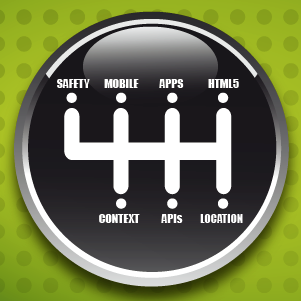W3C and Automotive Industry Start New Web Standards Work for Connected Cars
3 February 2015 — In recognition of increased consumer demand for data and services in Connected Cars, W3C announced today a new automotive industry collaboration to bring drivers and passengers a rich Web experience. The effort will focus initially on giving application vendors standard and more secure access to vehicle data.
"Car owners want access to the Web and receive real-time updates about their vehicles and the world around them, including weather, traffic, and parking information," said Jeff Jaffe, W3C CEO. "They also want smooth integration with their mobile devices. No other platform can match the Web's ability to bridge the diversity of data that will come from the car, user devices, the Web, and the Internet of Things. But we need to enable Web access in a way that does not compromise safety, and to provide secure access to data in a way that takes into account user privacy preferences. The auto industry's support for this new initiative is an encouraging sign that the Open Web Platform will help make driving safer and more fun."
In February 2013 auto manufacturers, chip makers, browser makers, and mobile operators began work at W3C on draft specifications for car data, such as vehicle identification, acceleration and speed, tire pressure, battery status, and personalization information such as seat position and climate information. Today's new Automotive Working Group is chartered advance those draft specifications to Web standards.
"Connectivity is transforming the car industry," said Matt Jones, Head of Future Infotainment at Jaguar Land Rover. "We believe the Web is the auto industry's best path forward to keep up with rapidly changing consumer expectations and evolving technology, as well as addressing challenges such as over-the-air updates and advanced diagnostics. Using Web technology in the car will reduce time to market for automotive apps, and allowing more innovation from existing development teams."
Numerous automotive industry leaders participated in the Automotive and Web Platform Business Group that created the draft specifications, including: BSQUARE, BlackBerry, Continental, Ford, General Motors, GENIVI Alliance, German Research Center for Artificial Intelligence (KI) Gmbh, Harman, iHeartMedia, Intel, JEITA, Jaguar Land Rover, Japan Automobile Research Institute, KDDI, LG Electronics, Mitsubishi, Nokia, Obigo, OpenCar, Orange, Pandora Media, Porsche, Samsung, Telenor, TotalFinaElf, Verisign, Visteon, Vodafone, and Volkswagen.
"GENIVI Alliance members represent broad interests in the automotive industry, including leading OEMs, Tier 1's, OSV, Middleware, Hardware, Service Providers, and Chip Makers," said Philippe Gicquel, GENIVI President. "What unites them is the shared commitment to broad adoption of an open platform for in-vehicle infotainment. We applaud the launch of this new W3C standards effort, which will spur innovation in our industry and make it much easier to bring those innovations to market.”
"The W3C, through the Automotive Business Group, has provided an excellent forum, bringing together a diverse set of stakeholders, where traditional automotive businesses such as OEMs and Tier 1's can openly collaborate with content and technology companies —not typically associated with the automotive industry— on use cases, requirements and draft specification reports," added Paul Boyes, Director of Telematics & Standards, OpenCar, and Co-chair of both the Business and Working Group. "With the creation of Automotive Working Group, this collaboration will continue resulting in standards that will pave the way for more rapid innovation in the connected car space, benefiting the entire industry."
In parallel to the standardization effort, the Automotive and Web Platform Business Group launched two years ago will now turn its attention to developing requirements on a number of new topics, including media tuners and speech interfaces.
"W3C represents the broadest range of interests in vehicle connectivity encompassing car makers and the broader connected car eco-system," said Roger C. Lanctot, associate director in the Global Automotive Practice at Strategy Analytics. "There are no hidden agendas, just a keen interest in enabling a platform for the rapid deployment and advancement of vehicle connectivity. And because that will increasingly include connectivity between vehicles, pedestrians, devices and infrastructure, the work of the W3C will speed the realization of a multiplicity of IoT applications and experiences."
In February 2015, W3C also launched new work on the Web of Things to accelerate the development of open markets for products and services based on tags, sensors and actuators, and other data on the Web.
About the World Wide Web Consortium
The World Wide Web Consortium (W3C) is an international consortium where Member organizations, a full-time staff, and the public work together to develop Web standards. W3C primarily pursues its mission through the creation of Web standards and guidelines designed to ensure long-term growth for the Web. The Open Web Platform is a current major focus. Over 390 organizations are Members of the Consortium. W3C is jointly run by the MIT Computer Science and Artificial Intelligence Laboratory (MIT CSAIL) in the USA, the European Research Consortium for Informatics and Mathematics (ERCIM) headquartered in France, Keio University in Japan, and Beihang University in China, and has additional Offices worldwide. For more information see http://www.w3.org/
Media Contact
For W3C, Ian Jacobs: <[email protected]>, +1.718 260 9447
